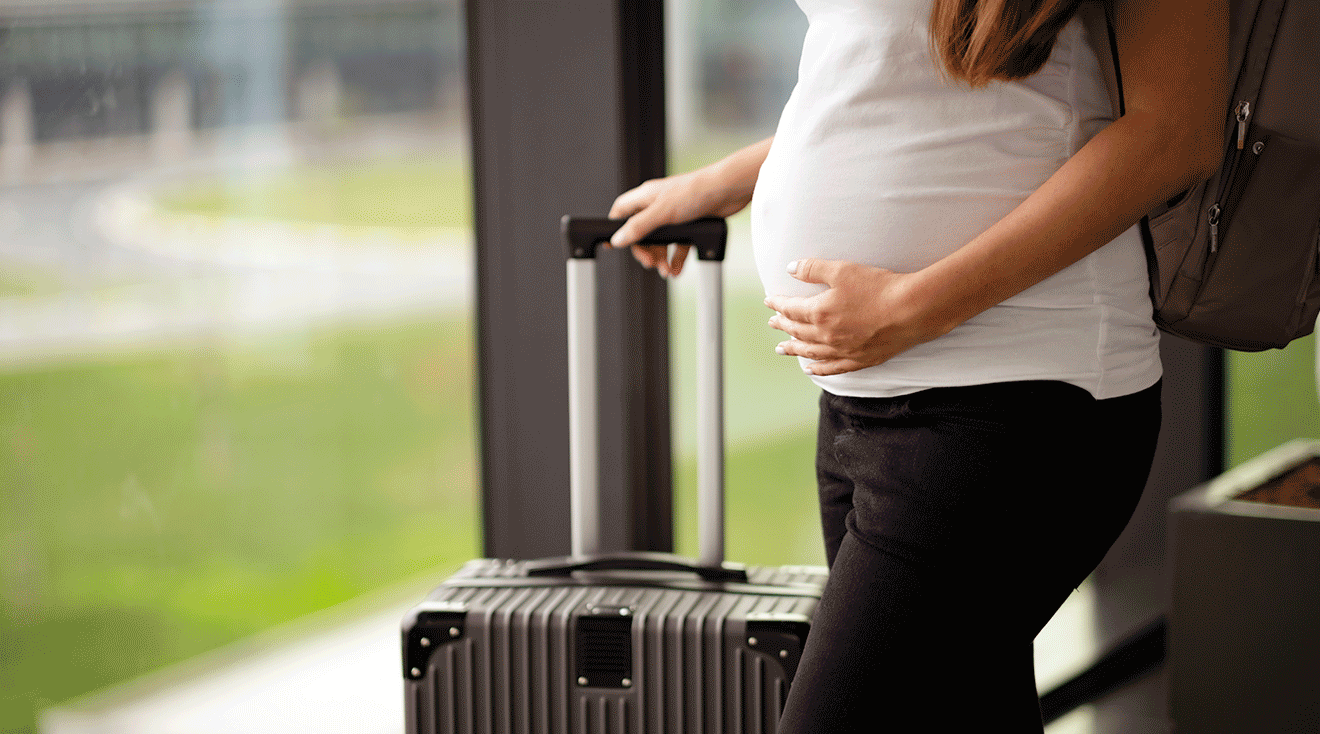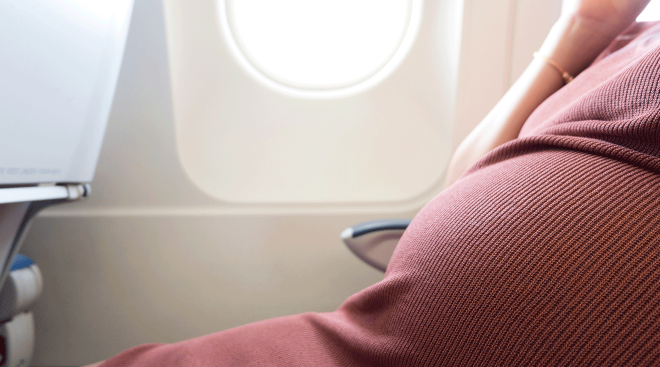Top Tips for Traveling While Pregnant
Thinking about planning a trip during your pregnancy? Whether you’re exploring your options for an upcoming babymoon, visiting family across the country or planning a quick girlfriends’ getaway, you likely have questions about traveling while pregnant. Is it better to drive or take the flight? And are there any pregnancy travel restrictions to know about? When should you stop traveling in pregnancy? Keep reading for expert guidance on pregnancy travel safety—plus tips on how to stay comfortable during your trip.
According to the American College of Obstetricians and Gynecologists (ACOG), as long as you haven’t experienced complications, traveling while pregnant is typically considered safe until you’re close to your due date.
The best time for pregnancy travel is in your second trimester, between 14 and 28 weeks, says Meleen Chuang, MD, an ob-gyn and clinical associate professor at the Family Health Centers at NYU Langone. “The risk of complications is lower during this period,” she says. Plus, most people report feeling more energized, are able to move around easily and are past the worst of their morning sickness during this time.
According to Sherry Ross, MD, an ob-gyn and women’s sexual health expert, some people may also be able to safely travel up to 34 weeks. That said, while most airlines allow pregnant people to fly domestically up to 36 weeks and 28 weeks internationally, some restrictions may apply, so it’s essential to check with the airline beforehand, Chuang notes.
There are some medical conditions that may make it inadvisable for you to travel during pregnancy. However, it’s important to note that most of the following information may only be applicable when taking a flight or traveling internationally. The Centers for Disease Control and Prevention (CDC) cite the following as reasons not to travel while pregnant:
- History of preeclampsia or gestational diabetes
- History of premature labor or premature rupture of membranes
- History of blood clots
- Previous miscarriage or ectopic pregnancy
- History of infertility
- Severe anemia
- A twin or multiples pregnancy
- Placental abnormalities (like placental abruption or placenta previa) or vaginal bleeding during pregnancy
- An cervical insufficiency and uterine irritability
- Any conditions that can increase risk of preterm labor
It’s important to note that this list is not all-inclusive—and may look vary based on your unique medical history and circumstances. For these reasons, it’s always best to check with your ob-gyn prior to making any extensive travel arrangements.
While it’s okay to travel while pregnant with the green light from your ob-gyn, there are some things you’ll want to consider and prepare for beforehand.
Medical access in case of emergency
No one wants to think about emergencies while traveling or vacationing, but sometimes things can go wrong. For this reason, Chuang recommends picking travel destinations with accessible medical facilities, and researching their prenatal care beforehand. Moreover, you’ll want to make sure your medical insurance covers you while traveling, and that your travel insurance provides coverage for pregnancy-related issues.
As you prepare for your trip, make note of any local emergency numbers and important contacts (like your doctor) and keep them in a handy place. The ACOG also suggests getting a prenatal checkup done before you leave. “Bring a copy of your prenatal records with you,” Chuang advises, as well as a travel health kit with any medications and comfort essentials. And don’t forget to make sure your immunizations are up to date, particularly for the COVID and flu vaccines.
Symptoms that constitute a medical emergency
What constitutes a medical emergency during travel? Below, ACOG notes the following red flag symptoms to watch out for:
- Vaginal bleeding
- Pelvic or abdominal pain
- Contractions
- Fluid leakage (i.e. if your water breaks)
- Persistent headaches
- Seeing spots or changes in eyesight
- Swelling in your hands and face
- Severe vomiting or diarrhea
- Any signs of deep vein thrombosis (warmth, sudden swelling, pain, redness, etc.)
- Discolored spot on leg that’s warm to touch (especially if it’s behind the knee)
- Decreased fetal movement
- Chest pain or shortness of breath
“If you experience any of these symptoms while traveling, seek medical attention immediately,” Chuang says.
Vaccines for international travel during pregnancy
Any pre-travel requirements, such as vaccinations, are a big thing to consider when picking your destination, particularly if you’re traveling internationally. You’ll want to be careful of places that require live-virus vaccines. “Check if any vaccines are recommended or required for your destination, and consult with your healthcare provider to ensure they’re safe during pregnancy,” Chaung says. And be wary of places that have high altitudes and routine infectious outbreaks (i.e. malaria, Zika, etc.), advises Johns Hopkins Medicine.
Where to stay during pregnancy travel
Where you stay will ultimately depend on your personal preferences—and there’s no right or wrong answers. “Whether it’s an Airbnb or a hotel, make sure it meets your needs and comfort level,” Chuang says. One way to help make your decision is to find out what amenities you’ll be offered. You might also want to consider how far your lodgings are from activities and how you’ll be getting around.
Food safety for traveling while pregnant
A healthy diet is key—and you already know there’s a slew of food options you should avoid during pregnancy, such as raw items, unpasteurized dairy and more. While the FDA has select laws in place around pasteurization and food quality in the US, those same rules may not apply in an international destination. You’ll want to take extra precautions to avoid anything that’s undercooked, unpasteurized or has been sitting out for too long.
You’ll also want to stay on top of your hydration needs, and this can be hard while traveling. Make sure the tap water is safe to drink, or opt for bottled water to be safe. “If you’re prone to constipation while you travel, you may want to take a magnesium supplement while you’re away to help keep your bowel movements more regular,” adds Rebekah Mustaleski, CPM, a certified professional midwife and compression director at Motif Medical.
Wondering if some pregnancy travel methods are safer than others? According to Chuang, it’s usually safe to travel by car, train or boat, as well as by air, if you’ve been cleared by your doctor. Below, some tips to keep in mind depending on your mode of transportation.
Flying while pregnant
Again, always check in with your airline to find out their specific requirements and policies around [flying during pregnancy]((thebump.com/a/flying-while-pregnant). Some may have documentation required or pregnancy travel restrictions, Chuang says. It may also be helpful to let your airline know you’re pregnant while booking in case they can provide any additional assistance as needed. Another important tip for flying while pregnant? Chuang advises pregnant flyers to stay hydrated and get up to move around from time to time to prevent the risk of blood clots (which pregnant people are already at risk for).
Driving while pregnant
“The decision to drive while pregnant depends on individual comfort and safety,” Chuang says. For some, driving while pregnant may be easier than other methods of transportation. For starters, it allows you to have more room to pack comfort essentials you may not otherwise be able bring, such as a pregnancy pillow, foot rest, extra large bottle of water, etc. Just be sure to wear your seatbelt throughout your journey. According to the National Highway Traffic Safety Administration (NHTSA), buckling up through all stages of pregnancy is the single most effective action you can take to protect you and baby in the event of a crash. Wear your seatbelt correctly by placing it across your chest between your breasts, with the lap belt secured below your belly so that it’s snug across your hips and upper thighs.
Taking a cruise while pregnant
Going on a cruise while pregnant is generally safe, but it’s important to check with the cruise line regarding their policies and any restrictions they may have for pregnant passengers, Chuang says. For example, Royal Caribbean and Celebrity Cruises don’t allow pregnant people travel on their ships past 23 weeks, while Carnival Cruise Lines and Princess Cruise Lines place the cutoff at 24 weeks. One important note if you book a cruise: Make sure there’s medical access on board.
Train or bus travel while pregnant
As long as you’re comfortable and feel safe on your train or bus, using this travel method is usually considered safe for pregnant people, Chuang says. Remember to get up and move around from time to time to improve circulation, Chuang says. She also recommends elevating your legs when possible, doing ankle exercises, wearing compression socks, loose fitting clothing and drinking lots of water to help with swelling. Plus, ensure you have snacks and medicines should you start to feel sick during your travels.
Regardless of how you travel, Ross advises following a healthy routine, staying on top of taking any prenatal vitamins recommended by your doctor and making sure you get movement. If you feel sick after your vacation or have symptoms, reach out to your provider immediately.
When should you stop traveling when pregnant? “If you’re close to your estimated due date, you may want to stay at home in case you do go into labor,” says Mustaleski. But, again, the timing will vary depending on multiple circumstances and your mode of transportation: “It’s best to consult with your healthcare provider to determine the most appropriate time for you to stop traveling,” Chuang says.
When it comes to top tips for traveling while pregnant, few people are able to help the way real parents who’ve been there can. Below, some tips from moms on how to stay comfortable.
-
“Bake in extra time for everything you do: catching a flight, making road trip pit stops, heading to the beach. Don’t hold yourself to an unrealistic schedule—travel should be relaxing, not stressful. And whatever you do, make sure you bring your maternity pillow. I don’t care what you need to eliminate from your suitcase to accommodate that big bed-hog eye-sore. A comfortable night’s sleep is worth the extra carry-on item!” - Lauren B., mom of three
-
“Since I wasn’t exactly a speedy walker during the third trimester, it helped to stay in walkable areas where everything is near the hotel. Also—and this might seem obvious—if you’re further along, be sure to stay in places that have elevators (unless you enjoy walking up and down the stairs several times a day while carrying 30 extra pounds on you—in which case, you do you!” - Natalie G., mom of one
-
“During the first trimester, I’d definitely say bring ginger candies or whatever works for you to fight nausea, because takeoff and landing can provoke it inflight. And choose the aisle set. We all love window seats, but remember that you’ll have to pee 200 times.” - Milena K., mom of two
-
“Wear compression socks and comfortable shoes. Also dress in layers, since pregnant moms can run hot. And don’t forget to wear sunscreen!” - Ashlee N., mom of two
-
“I brought along a few books to give me the encouragement and sense of calm I needed during this time of so many unknowns. I found Ina May Gaskin’s Guide to Childbirth inspirational and moving, and it ended up pacifying some of my major concerns around giving birth. Oh, and pantyliners! Don’t forget to pack some pantyliners for unexpected discharge.” - Daniela M., mom of two
While it may seem intimidating, know that traveling during pregnancy is usually completely safe up until around 36 weeks, Chuang says. The best thing you can do for a safe and comfortable trip is consult with your doctor to get their input and advice for your specific pregnancy.
Please note: The Bump and the materials and information it contains are not intended to, and do not constitute, medical or other health advice or diagnosis and should not be used as such. You should always consult with a qualified physician or health professional about your specific circumstances.
Plus, more from The Bump:
Meleen Chuang, MD, is an ob-gyn and clinical associate professor at the Family Health Centers at NYU Langone. She earned her medical degree from SUNY Stony Brook.
Rebekah Mustaleski, CPM-TN, IBCLC, is a certified professional midwife specializing in evidence-based maternity care. She co-founded Roots & Wings Midwifery in Knoxville, Tennessee. Mustaleski received her bachelor’s degree in psychology from Centre College, and worked as a doula and birth photographer prior to establishing Roots & Wings.
Sherry Ross, MD, is an ob-gyn, women’s sexual health expert and author of She-ology: The Definitive Guide to Women’s Intimate Health. Period. and She-ology, The She-quel: Let’s Continue the Conversation. She earned her medical degree from New York Medical College.
American College of Obstetricians and Gynecologists, Travel During Pregnancy, July 2023
Centers for Disease Control and Prevention, Pregnant Travelers: CDC Yellow Book 2024, May 2023
Johns Hopkins Medicine, Traveling While Pregnant or Breastfeeding, 2023
National Highway Traffic Safety Administration, If You’re Pregnant: Seat Belt Recommendations for Drivers and Passengers
Royal Caribbean International, May I board a Royal Caribbean ship if I am pregnant?
Celebrity Cruises, Medical Needs, 2023
Carnival Corporation, Pregnancy Policy
Princess Cruises, Pregnancy, 2023
Centers for Disease Control and Prevention, Vessel Sanitation Program, August 2023
Learn how we ensure the accuracy of our content through our editorial and medical review process.
Navigate forward to interact with the calendar and select a date. Press the question mark key to get the keyboard shortcuts for changing dates.





















































